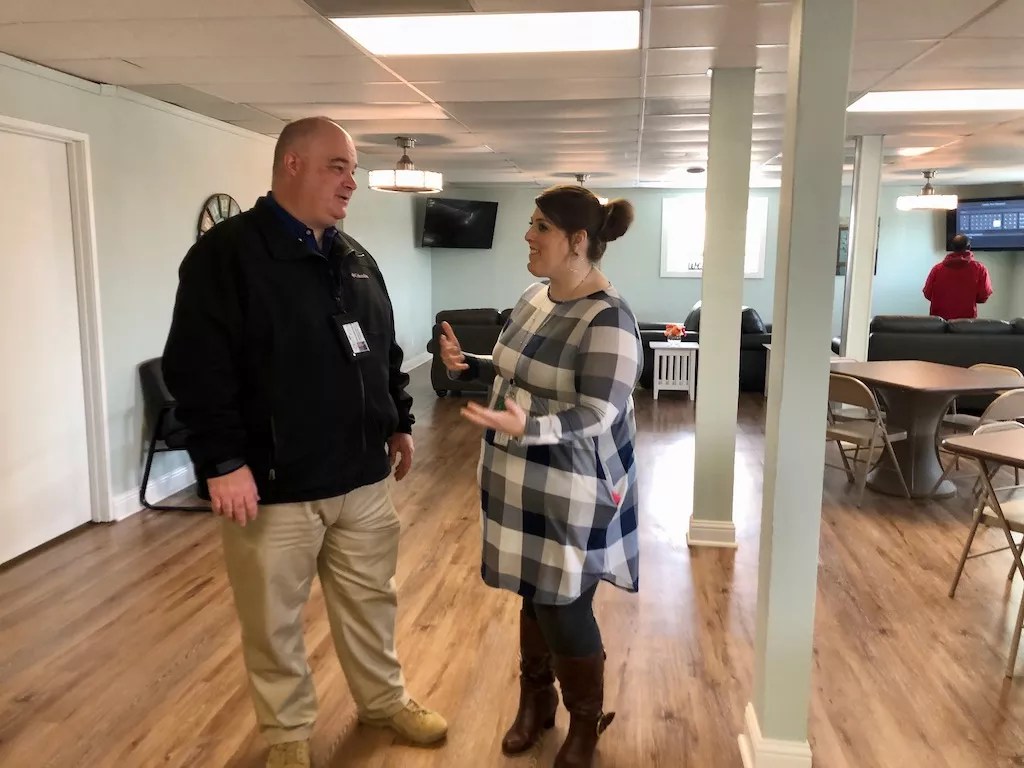
Lucas Manfield

Audio By Carbonatix
Dallas’ jails and emergency rooms are overwhelmed by mental health crises. These institutions of last resort have become the only option for many “high utilizers,” people who return time after time in need of medication or counseling.
It’s not their fault, explains Jessica Martinez, the chief clinical officer at a new South Dallas facility operated by the North Texas Behavioral Health Authority that is designed to divert clients from what she calls “the revolving door” of institutionalization.
“If you go into the ER, what does your discharge paperwork say? Return to ER or call 911,” she said. “These individuals who have been identified as a problem for the community are doing the exact thing they have been told to do. So we are trying to create something different.”
Unofficially named The Living Room, the facility quietly began seeing clients in May. Since then, it’s helped over 200 people, most of whom are bused in after being discharged from the emergency room or jail.
For some, the impact has been dramatic.
Martinez ran the numbers for one client. In one week, that person had showed up at the emergency room 28 times. After he began receiving help from the Living Room, he returned to the ER only twice.
Most of the center’s clients are homeless. Many need substance-abuse treatment.
They simply aren’t able to navigate the county’s myriad behavioral health services, said Chad Anderson, a director at the center. In many cases what they really need is a helping hand and a roof over their head – not another hospital bed.
Mental health patients are released from the hospital with 14 days’ worth of medications. Even if they make it to a clinic to fill a prescription, they often can’t pay for it. As a result, people slip through the cracks.
The Living Room is not a residential facility or a medical center. Rather, the facility is staffed by social workers who help clients get back on their feet.
“Someone is standing with that person on one end of the swimming pool, and telling them they have to swim across holding a cinder block. That person jumps in and they struggle,” Anderson said.
The Living Room is not a residential facility or a medical center. Rather, the facility is staffed by social workers who help clients get back on their feet. It’s the only one of its kind in Texas.
Staffers connect clients to housing. They usually find them spots at local boarding homes. And they sign them up for health insurance and other government benefits, which have often been terminated because of prolonged stays in the hospital or jail.
They also help clients manage their medications: Counselors from the Association of Persons Affected by Addictions walk clients to the pharmacy to make sure they fill their prescriptions. They stay with them all night, if necessary.
Texas routinely places near the bottom in national rankings of state behavioral health systems. This year, Mental Health America ranked Texas’ “access to care” dead last.
But the Living Room is a sign that the state legislature is beginning to take the problem seriously. The North Texas Behavioral Health Authority, which coordinates behavioral health care in Dallas and its surrounding counties, has recognized the need for a new type of crisis center for years, said Anderson. But only recently was the money available to make it a reality, thanks to a 2017 state law that earmarked millions for local behavioral health initiatives.
“The last two legislative sessions, mental health has gotten more of a focus and the legislature has started letting out funds,” Anderson said.
The center joins a series of recent initiatives in Dallas to divert people with mental illness from the criminal justice system.
In 2018, Parkland teamed up with the Dallas Police Department to deploy specially trained teams to calls involving mental health crises in South Central Dallas. And this year, Dallas County District Attorney John Creuzot promised to stop prosecuting criminal trespass cases that simply involved loitering on public property, a common way that a mental health crises can result in jail time. Creuzot is also spearheading the development of a new jail “deflection center” for the homeless and people with mental illness.
Anderson hopes that The Living Room will provide police with another alternative to jail. But that’s still on the drawing table.
“This is the initial phase,” he said. There are talks with the police department about further cooperation and plans to expand the complex to include a full-fledged medical center.
In the meantime, the center’s eight employees are focused on fixing the system one client at a time.
“That need is very, very high,” Anderson said, “and somebody’s got to do it.”